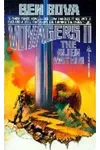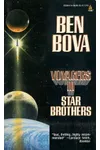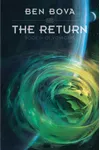Step into the thrilling cosmos of Ben Bova’s Voyagers series, where humanity’s first brush with alien intelligence sparks a saga of wonder, danger, and discovery! This hard science fiction gem follows ex-astronaut Keith Stoner as he unravels the mysteries of an extraterrestrial spacecraft, blending cutting-edge science with gripping human drama. Perfect for fans of Arthur C. Clarke or Carl Sagan, Voyagers invites you to explore the stars and question what it means to be human.
Across four novels, Bova crafts a universe where interstellar exploration meets profound philosophical questions. With its mix of Cold War intrigue, futuristic tech, and alien encounters, the series captures the imagination of sci-fi lovers eager for a thought-provoking ride.
How Voyagers Began
Ben Bova, a Hugo Award-winning author and former editor of Analog, launched Voyagers in 1981, inspired by his passion for space exploration and humanity’s potential among the stars. Drawing from his work on NASA’s Project Vanguard, Bova envisioned a story grounded in real science but soaring with speculative ambition. The series emerged during a sci-fi boom, reflecting Cold War tensions and the era’s fascination with SETI (Search for Extraterrestrial Intelligence).
Bova’s goal was to weave a narrative that balanced rigorous scientific detail with human emotion, creating a saga that felt both plausible and exhilarating. Over nearly three decades, Voyagers grew into a four-book epic, cementing Bova’s reputation as a master of hard science fiction.
The Heart of Voyagers
The series kicks off with Voyagers (1981), where physicist Keith Stoner detects signals from an alien spacecraft hurtling toward Earth. As global powers scramble to control the discovery, Stoner risks everything to confront the enigma, setting the stage for a high-stakes first contact. Voyagers II: The Alien Within (1986) picks up 18 years later, with Stoner awakening from stasis, now merged with an alien consciousness that reshapes his view of humanity.
Voyagers III: Star Brothers (1990) sees Stoner wielding nanotechnology-driven powers, grappling with corporate greed and global crises while spreading alien tech to save Earth. The saga concludes with The Return (2009), where Stoner returns after a century among the stars to a dystopian Earth ravaged by environmental collapse and religious extremism. Themes of human resilience, the ethics of technology, and the search for meaning shine through, all set against a backdrop of interstellar adventure.
Bova’s style blends meticulous scientific accuracy with character-driven drama, though some critics note a soap-opera-esque flair in relationships. The series tackles big ideas—climate change, political strife, and the transformative potential of alien contact—while keeping readers hooked with Stoner’s personal evolution.
Why Voyagers Resonates
Voyagers stands out for its prescient take on humanity’s future, foreshadowing debates about climate change and technological ethics. Fans praise its blend of cerebral science and emotional depth, even if some find the pacing uneven or the drama a tad melodramatic. Its influence lingers in the sci-fi genre, inspiring readers to ponder our place in the universe and the challenges of first contact.
Despite mixed reviews, with ratings averaging around 3.5 stars on Goodreads, Voyagers remains a cult favorite for its ambitious scope and Bova’s knack for making complex science accessible. Its legacy endures as a testament to the power of speculative fiction to spark curiosity and hope.
About Voyagers
- Publication Span: 1981–2009
- Number of Books: 4
- Author: Ben Bova, six-time Hugo Award winner
- Genre: Hard Science Fiction
Ready to blast off? Grab Voyagers and dive into a universe where humanity’s greatest adventure awaits!



